David Barton just can’t stop it.
In a letter to the editor of the Wall Street Journal, Barton says his book, The Jefferson Lies, is “upcoming.” He also falsely says that Virginia state law prohibited Jefferson from emancipating his slaves.
On July 2, Fergus Bordewich wrote a review of two books on Thomas Jefferson. At least one of the books mentioned David Barton by name as an example of an author who elevated Jefferson to counterfactual heights. Barton was offended and so the WSJ allowed him space to defend himself (might require an account to read it all).
First, Barton defends Jefferson against the charge of having children with Sally Hemings. My reading of that material is that one cannot be sure about the truth. Barton is more sure of himself there than he should be.
It is intriguing that Barton calls The Jefferson Lies “upcoming.” Naturally, he failed to mention that another description of the book would be “removed from the shelves” or “debunked.” I have established that Simon & Schuster is not going to publish it so it is now a mystery who will publish the second coming of the book voted by History News Network readers as the least credible history book in print.
Regarding Jefferson and slavery, Barton sticks to his false claims about Virginia law. He says Virginia limited emancipation starting in 1691. In 1723, Barton says Virginia law prohibited freeing slaves. He is correct that in 1782 Virginia allowed emancipation but then takes us down a rabbit trail. He says slave owners had to provide income for young, old or infirm slaves. That sounds like all of them. However, slaves between 18 (females) or 21 (males) and 45 could be emancipated (see the case of Robert Carter who freed all of his slaves). Jefferson freed exactly two of his more than 200 slaves during that period of time, both members of the Hemings family. It not only was legal to do, Jefferson did it twice, and other slave owners freed some or all of their slaves.
Barton then does what he often does. He pulls out something true but fails to tell us when it was true. Barton said the 1782 law required freed slaves to leave the state. Not true. It was not until 1806 that the requirement to leave the state was added to Virginia law, and even then the legislature could exempt a slave upon request. Thus, there was a 24 year period where Jefferson could have freed his adult slaves to remain in Virginia.
In his WSJ defense, Barton reveled in author Andrew Burstein’s reference to him as a “self-taught historian.” In Barton’s case, self-taught means unable to self-correct. He is still making the same mistakes that caused Thomas Nelson to pull The Jefferson Lies from publication.
Tag: Wall street journal
Mark Driscoll and Result Source: What About the Other Best Seller Lists?
By now, most people know that Mars Hill Church entered into a contract with ResultSource Inc. to place Mark and Grace Driscoll’s book Real Marriage on to the New York Times Best Seller List. World Magazine broke that story and then I posted the contract between MHC and RSI. Overlooked in the fallout from that story is that Real Marriage also made it on other best seller lists. According to the contract, this was by design.
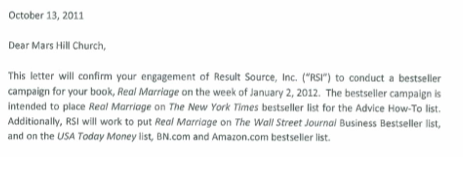
Note that RSI pledged to attempt to Real Marriage on best seller lists published by the Wall Street Journal and the USA Today.
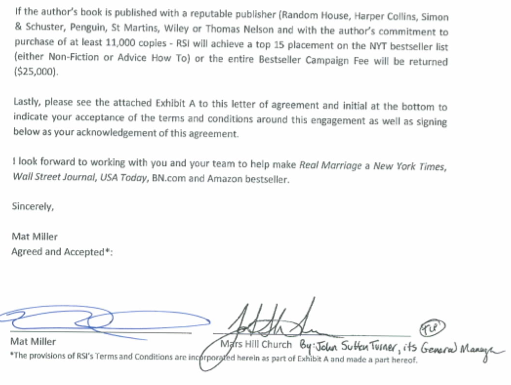
Although RSI was only obligated to make a top 15 placement on the NYT list, the other publications were mentioned as targets with expectation for success.
Initially the position of Mars Hill Church through spokesman Justin Dean was that the RSI-MHC partnership was an “opportunity” and an “investment.” Two days later, the MHC Board of Advisors and Accountability said the arrangement was “common” but “unwise.” Then, days later, Mark Driscoll said he initially saw the scheme as a way to market books but had come to see it as “manipulating a book sales reporting system” and thus “wrong.” He also said he was going to ask his publisher not to use the “#1 best seller status” on future publications. Quickly, the designation came off of his Mars Hill bio.
But what about the other best seller lists? Did he make those as well?
Consistent with the aspirations expressed in the contract, Real Marriage did make other best seller lists in early January and then as with the NYT list, the book fell off those lists after the campaign was complete. The book went to #3 on Publisher’s Weekly list, #8 on Wall Street Journal’s Nonfiction Combined list (week ending Jan. 8), and #38 on USA Today’s Top 150 Books (entered the list Jan. 12 for one week). In contrast to his stance on the NYTs list, Driscoll continues to refer to those lists on his website:
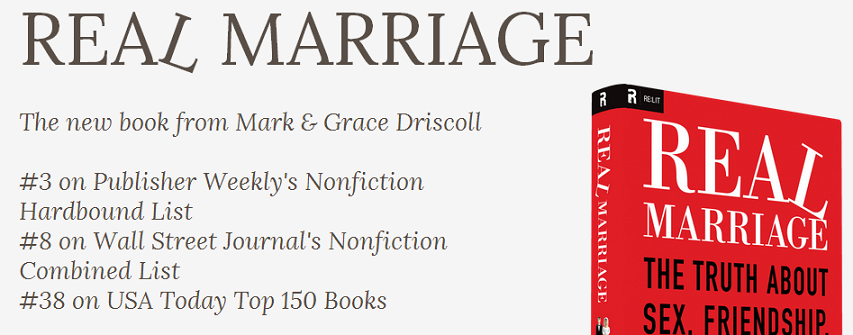
At one point, this list also carried the #1 NYT best seller designation, so someone edited the page and decided to leave these placements alone.* Although the NYT best selling designation is more prestigious, another look at the contract demonstrates that the RSI scheme manipulates the efforts of several respected publications to estimate customer interest in books.
*Although these links are probably dead on arrival, there are multiple places on pastormark.tv where the NYT designation is still in place.
UPDATE: All links to pastormark.tv are now dead. I have copies of the pages but the current links go to a page that says, “We couldn’t find that.”
Writing Recycling: A New Wrinkle in the Mark Driscoll Plagiarism Controversy?
In 2012, journalist Jonah Lehrer came under fire for self-plagiarism.* Lehrer eventually lost his job due to recycling and inventing material, notably attributing false quotes to Bob Dylan. While writing for the New Yorker, Lehrer posted a column which began in nearly the same manner as a column published by the Wall Street Journal during the previous year. Jim Romenesko first reported Lehrer’s recycled material. To see how similar they are (nearly identical), you can go to Romenesko’s blog and/or compare the Wall Street Journal article with the New Yorker version. A lengthy description of recycling is provided by the Reluctant Habits blog.
Once the New Yorker learned of the reuse of material, the editor posted the following statement:
Editors’ Note: The introductory paragraphs of this post appeared in similar form in an October, 2011, column by Jonah Lehrer for the Wall Street Journal. We regret the duplication of material.
Eventually, it was learned that Lehrer had double dipped on other occasions. Although some complained about the term, “self-plagiarism,” his conduct was of intense interest to his peers. Lehrer eventually said about his actions, “It was a stupid thing to do and incredibly lazy and absolutely wrong.”
In summary, the publishers involved took the recycling seriously, they made readers aware of the duplication, and Lehrer said what he did was stupid, lazy and wrong.
It is unclear to me how the Christian publishing world regards recycling material when multiple publishers are involved. In this post, I am simply going to point out an occasion of recycling in Mark Driscoll’s books. I have been reading several of them, and I can tell you there are more instances. For now, I will stick with the case of Driscoll recycling material from Religion Saves: And Nine Other Misconceptions published by Crossway Books in 2009 into Real Marriage published by Thomas Nelson in 2012.
First, both books contain a description of pornography. They are nearly identical.**
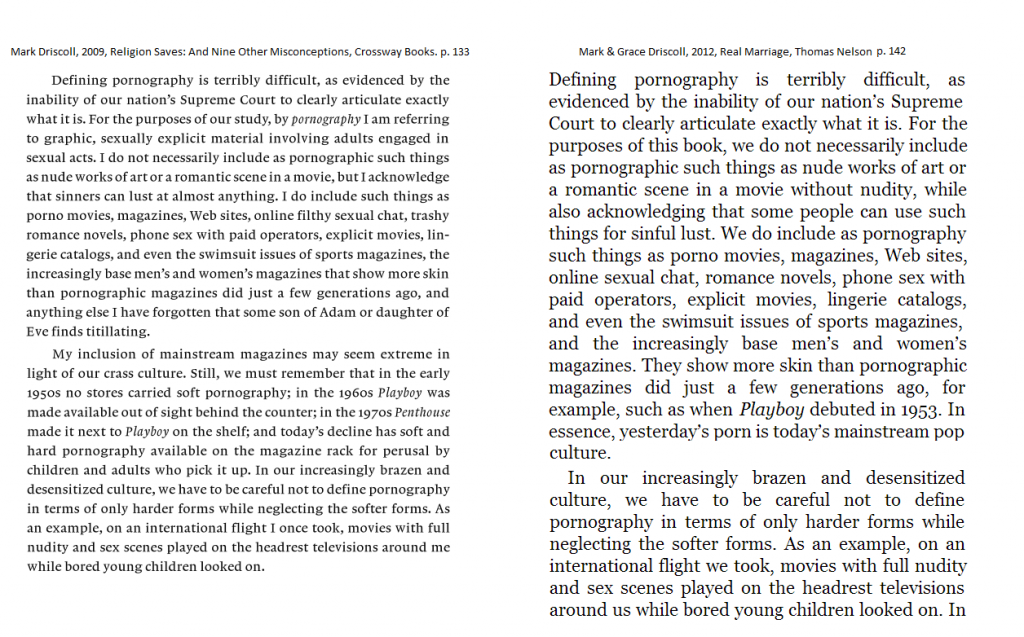
In both books following the description of porn, Driscoll provides a summary of the aspects of pornography. In Real Marriage, it comes on page 143.
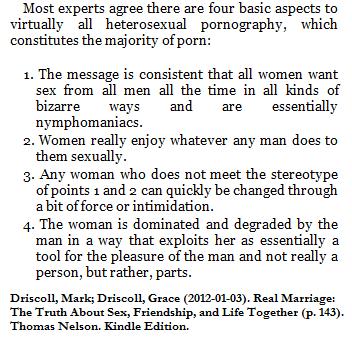
As an aside, no experts are cited and I haven’t figured out where he got that list.
Now, here is the same material from Religion Saves published earlier by Crossway Books.
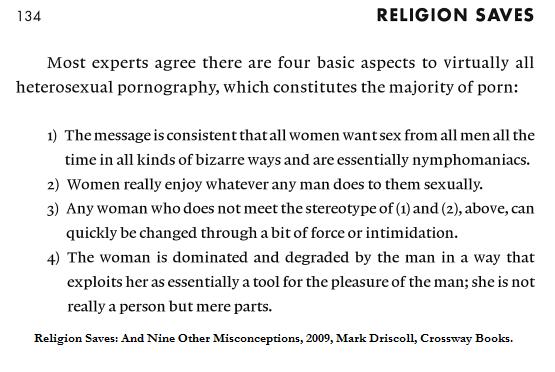
The passages are identical. Perhaps there is some undisclosed arrangement between the publishers, but I can’t find any permission or acknowledgment in Real Marriage that this material comes from a book published by Crossway.
In Real Marriage on page 113, Driscoll writes:
The life of a prostitute is incredibly dark: 62 percent report having been raped in prostitution. In one study, 75 percent of women in escort prostitution had attempted suicide; prostituted women comprised 15 percent of all completed suicides reported by hospitals.
On page 140 in Religion Saves, the same opening sentence is written (“The life of a prostitute is incredibly dark”) with the same statistics, albeit with a few additional stats.
On page 112 of Real Marriage, Driscoll writes:
The sexual revolution of the 1960s and ’70s radically altered the sexual landscape of our nation, so that today sex before marriage and viewing pornography are the culturally accepted norm.
The identical sentence can be found on page 130 of Religion Saves.
Much of chapter 5 in Religion Saves is recycled in Real Marriage. In both, Driscoll cites Jim Dobson on the story of Ted Bundy, and Patrick Carnes on sexual addiction. He recycles the material on sexual addiction with the same sexual addition criteria list from Carnes. He has identical statements about pornography and lust. Much of the same ground is covered in both books with no mention in Real Marriage of the exact same material being first published by Crossway in 2009.
Jonah Lehrer found that recycling material (and other misdeeds) caused quite a stir among journalists and led to publishers pursuing vigorous public actions to protect their interests and reputations. To me, the situations seem quite similar. It remains to be seen how Christian publishers will view extensive recycling of material from one publisher’s book to another by the same author.
*I first learned of the Lehrer story from Jake Dockter at The Great White Whale. In his piece Dockter asked many pointed questions based on what was known at the time. Many of those questions remain unanswered.
**I added this image as an update to the original article.
David Barton’s bad media day
No TGIF for David Barton last week.
First, the Wall Street Journal published a book review of The Jefferson Lies by Alan Pell Crawford which briefly takes apart the book. Crawford begins by agreeing with Barton that Jefferson’s connection to his slave Sally Hemming’s children has not been established. However, from there on, the review identifies problem after problem with The Jefferson Lies.
Continue reading “David Barton’s bad media day”
Sexual identity: Wall Street Journal reports on APA report and sexual identity therapy
(First posted on August 6, 2009)
The Wall Street Journal’s Stephanie Simon has captured well the application of the APA task force sexual orientation report in an article out this morning. Of course I would say that…
The men who seek help from evangelical counselor Warren Throckmorton often are deeply distressed. They have prayed, read Scripture, even married, but they haven’t been able to shake sexual attractions to other men — impulses they believe to be immoral.
Dr. Throckmorton is a psychology professor at a Christian college in Pennsylvania and past president of the American Mental Health Counselors Association. He specializes in working with clients conflicted about their sexual identity.
The first thing he tells them is this: Your attractions aren’t a sign of mental illness or a punishment for insufficient faith. He tells them that he cannot turn them straight.
But he also tells them they don’t have to be gay.
For many years, Dr. Throckmorton felt he was breaking a professional taboo by telling his clients they could construct satisfying lives by, in effect, shunting their sexuality to the side, even if that meant living celibately. That ran against the trend in counseling toward “gay affirming” therapy — encouraging clients to embrace their sexuality.
But in a striking departure, the American Psychological Association said Wednesday that it is ethical — and can be beneficial — for counselors to help some clients reject gay or lesbian attractions.
The APA is the largest association of psychologists world-wide, with 150,000 members. The association plans to promote the new approach to sexuality with YouTube videos, speeches to schools and churches, and presentations to Christian counselors.
According to new APA guidelines, the therapist must make clear that homosexuality doesn’t signal a mental or emotional disorder. The counselor must advise clients that gay men and women can lead happy and healthy lives, and emphasize that there is no evidence therapy can change sexual orientation.
But if the client still believes that affirming his same-sex attractions would be sinful or destructive to his faith, psychologists can help him construct an identity that rejects the power of those attractions, the APA says. That might require living celibately, learning to deflect sexual impulses or framing a life of struggle as an opportunity to grow closer to God.
While the report doesn’t use my exact words (e.g., I don’t say ‘you don’t have to be gay’), she does catch important aspects of the APA report and the stance I use within the sexual identity therapy framework. Furthermore, I don’t show the video at the same time in the same order of things to clients and then they make a decision about their direction. I do however, do extensive informed consent and answer lots of questions which involves videos and slides to answer. Thanks to Michael Bailey for those vids.
This report captures the essence of the novel findings in the APA report in contrast to the AP report which continues to present a polarized picture. For sure, as long as the dialogue around change is important to people, we keep talking past each other. However, when you look at what both sides actually claim, they are not that far apart. According to the AP report, Jones and Yarhouse are going to report over half of 61 subjects either changed or are celibate. Whatever the percentage, it is clear that change cannot be promised to clients as a predictable function of therapy or ministry. We should be able to agree about that and then place emphasis on belief and value congruence. From there, see what happens.